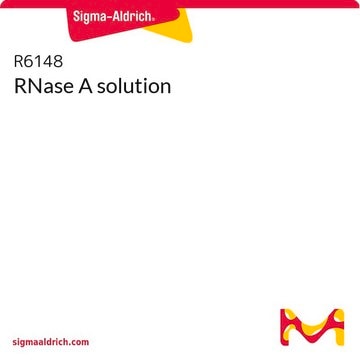NA0300S
GenElute™ HP Plasmid Maxiprep Kit
sufficient for 4 purifications
Synonym(s):
GenElute™ HP Plasmid Maxiprep Kit
About This Item
Recommended Products
usage
sufficient for 4 purifications
greener alternative product characteristics
Designing Safer Chemicals
Learn more about the Principles of Green Chemistry.
sustainability
Greener Alternative Product
technique(s)
DNA purification: suitable
greener alternative category
storage temp.
15-25°C
General description
An overnight recombinant E. coli culture is harvested by centrifugation and subjected to a modified alkaline-SDS lysis procedure followed by adsorption of the DNA onto a silica membrane in the presence of high salts. Contaminants are removed by two wash steps. Finally, the bound DNA is eluted in Elution Solution (Tris-HCl) or water.
The recovered plasmid DNA is predominately in its supercoiled form. The DNA is ready for immediate use in downstream applications such as restriction digestion, ligation, sequencing, PCR, transformation, and transfection.
Application
Features and Benefits
- From harvested bacterial culture to pure plasmid DNA in 30 minutes or less
- Up to 1.2 mg of high-copy plasmid DNA
- Flexibility of a vacuum or spin format
- Contains fewer plastic components than other high speed kits, reducing the amount of waste
- No phenol/chloroform extraction or alcohol precipitation required
Other Notes
Legal Information
Signal Word
Danger
Hazard Statements
Precautionary Statements
Hazard Classifications
Acute Tox. 4 Oral - Eye Dam. 1 - Flam. Liq. 3 - Met. Corr. 1 - Resp. Sens. 1 - Skin Corr. 1B - STOT SE 3
Target Organs
Central nervous system
Storage Class Code
3 - Flammable liquids
Flash Point(F)
77.0 °F - closed cup
Flash Point(C)
25 °C - closed cup
Certificates of Analysis (COA)
Search for Certificates of Analysis (COA) by entering the products Lot/Batch Number. Lot and Batch Numbers can be found on a product’s label following the words ‘Lot’ or ‘Batch’.
Already Own This Product?
Find documentation for the products that you have recently purchased in the Document Library.
Customers Also Viewed
Our team of scientists has experience in all areas of research including Life Science, Material Science, Chemical Synthesis, Chromatography, Analytical and many others.
Contact Technical Service












